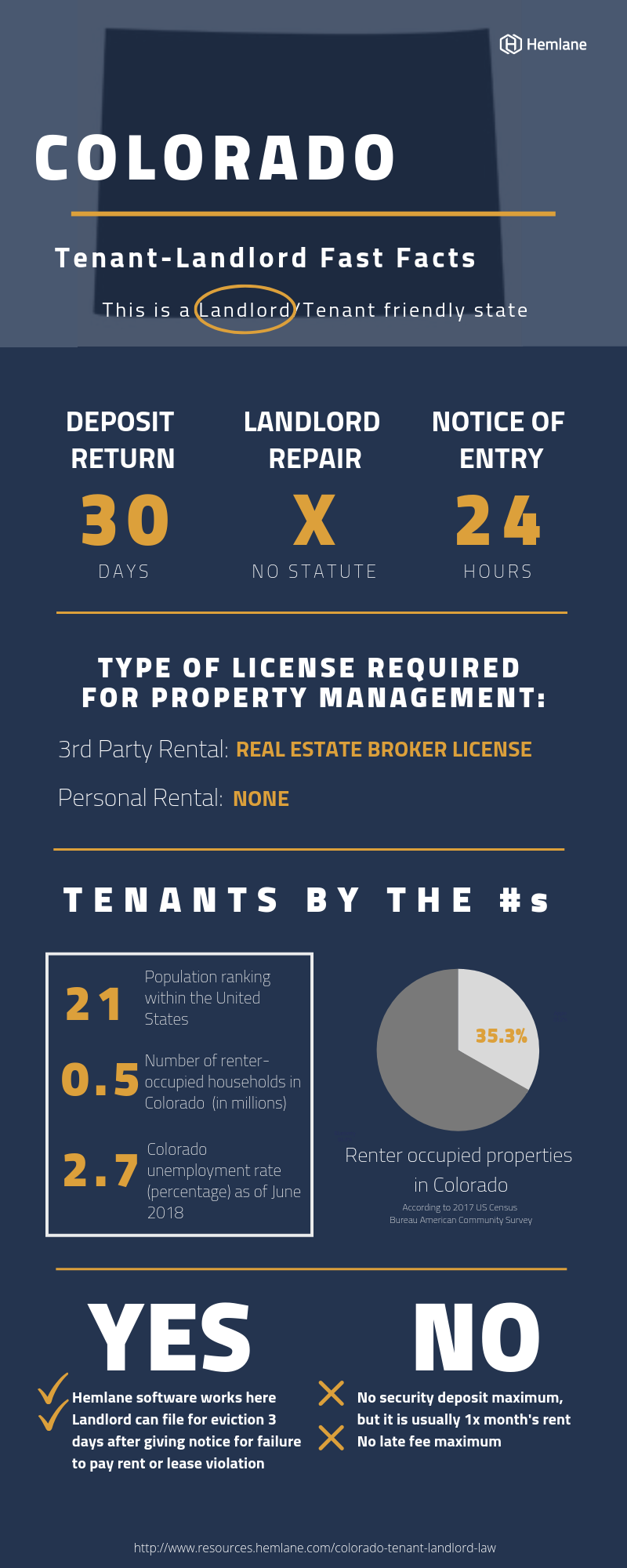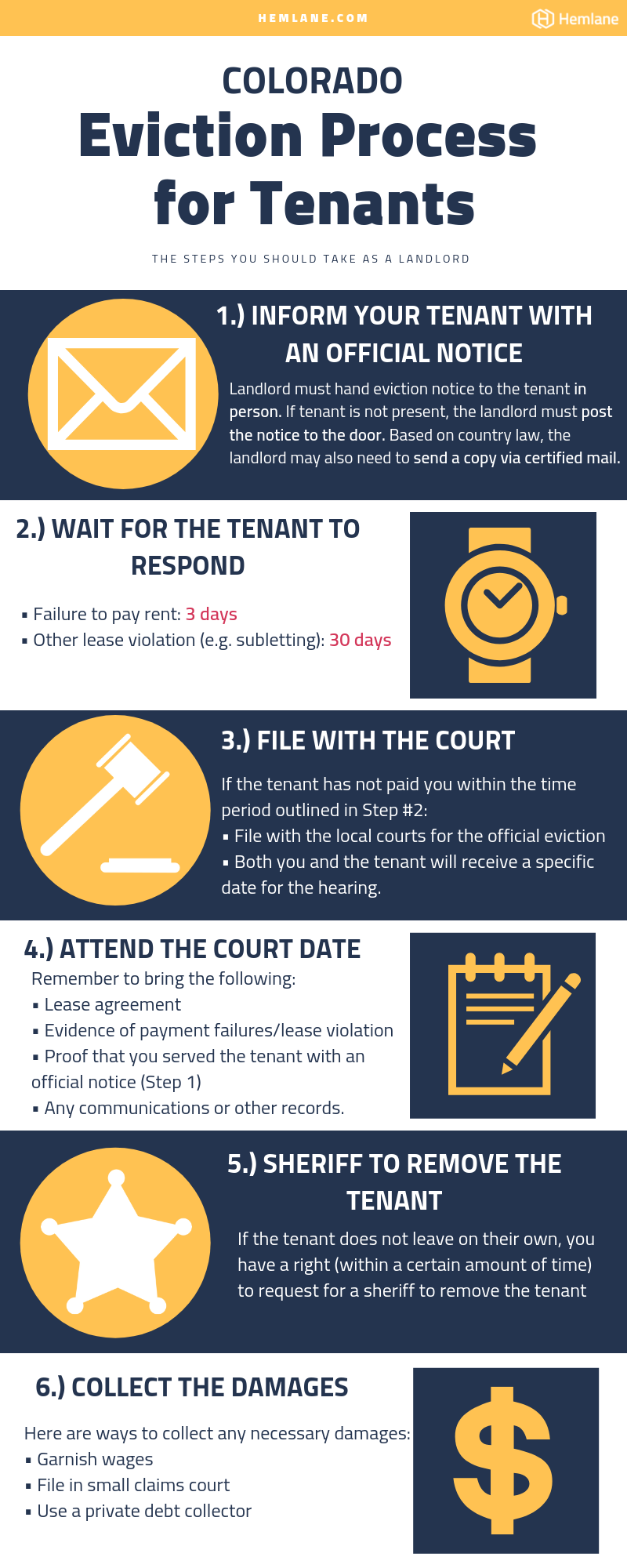Colorado Tenant-Landlord Law

Fair Housing
The Fair Housing Act was created in order to ensure that everyone is treated equally during the housing process. It protects tenants from discrimination when searching for a rental property. At the federal level the Fair Housing Act protects the following classes:
- Race
- Color
- National Origin
- Religion
- Sex
- Familial Status
- Disability
Learn about fair housing at the federal level here.
In addition to federal fair housing laws, Colorado state law also makes it illegal to deny housing based on:
- Ancestry
- Creed/Belief System
- Marital Status
- Sexual Orientation
Please note that the city you live in may have additional protected classes, which are added to the list of federal and state protected classes.
Learn more about Colorado fair housing laws here.
Security Deposits
- Collection of security deposits: In Colorado it isn’t required, but most landlords require them to prove a tenant’s financial stability and guarantee a payment for damaged property.
- Pet security deposit: Starting January 1, 2024, there will be a limit on how much a landlord or property manager can charge for the pet security deposit. These deposits must be refundable and limited to $300.
- Terms of the security deposit: There are no statutes regarding maximums, commingling assets, or paying interest, but most landlords charge equal to one month’s rent and keep the funds in a separate account.
- Returning the deposit: A landlord must return the deposit within 30 days of the tenant moving out, unless some other agreement was made, but it should never be more than 60 days. ((C.R.S. 38-12-103)
- Dangerous conditions: If unforeseeable, dangerous conditions cause a tenant to move out, the deposit must be returned within 72 hours (excluding Saturday, Sunday, and holidays) (C.R.S. 38-12-104)
- Withholding the deposit: If the landlord withholds a certain percentage and does not provide an itemized list of damages within the time period, the deposit must be returned in full (C.R.S. 38-12-103(2))
- Withholding the deposit: If the landlord intentionally and/or wrongfully withholds a deposit, he/she may be liable for three times the amount withheld in addition to legal fees (C.R.S. 38-12-103(2) and (3a))
Rent and Late Fees
- Late fees: There are no statutes regarding late fee maximums or grace periods.
- Pet rent: Starting January 1, 2024, pet fees are limited to $35 or 1.5% of the rent, whichever is higher. This fee is not refundable and is added to the monthly rent.
- Rental agreement required: For leases that are 12 months or longer, a rental agreement is required.
- Rent fee: Landlords may charge any reasonable amount for rent.
- Paying rent: There are no statutes regarding how (form of payment) / when (at the beginning or end of the month) rent must be paid.
- Withholding rent- tenant: Tenants are allowed to withhold rent for habitability issues. Certain restrictions found include:
- The landlord must be notified of the problems and provided reasonable time to make repairs (C.R.S. 38-12-507)
- The tenant must then give notice that the repairs haven’t been made and the landlord has failed to remedy the breach within five days of receipt of the letter from the tenant (C.R.S. 38-12-507)
Notices and Entry
- *Rent increase notice: *There are no statutes regarding rent increase notices.
- Entry into property: There are no statutes regarding entry onto the property for repairs, but 24 hours is recommended.
- There is also no statute regarding entry for emergency situations.
- Termination of yearly lease: If a landlord wishes to terminate a yearly lease early, a notice must given 91 days prior to termination (C.R.S. 13-40-107-1a)
- Terminating 6 monthly lease: If a landlord wishes to terminate a 6 month or longer lease early, a notice must given 28 days prior to termination (C.R.S. 13-40-107-1b)
- Terminating 1 month lease: If a landlord wishes to terminate a 1 month or longer (but less than 6 months) lease early, a notice must given 7 days prior to termination (C.R.S. 13-40-107-1c)
- Lease lasting 1 or more weeks: If a landlord wishes to terminate a 1 week or longer (but less than 1 month) lease early, a notice must given 3 days prior to termination (C.R.S. 13-40-107-1d)
- Lease lasting no longer than a week: If the lease is less than a week, the landlord only has to provide a notice 1 day prior to early termination (C.R.S. 13-40-107-1e)
- Time to cure a lease violation: Landlord must provide tenant with 10 days to cure a lease violation for unpaid rent or for the first violation of any other condition or covenenant of a lease agreement.Click here for more information
Disclosures
- Lead paint: A landlord is required to disclose any known presence of lead paint on the property. If there is a presence of lead paint in the unit or common area, the lease must include a federally-approved attachment on lead poisoning prevention.
- Domestic violence: A landlord is not allowed to terminate a lease of a domestic violence victim. (C.R.S. 13-40-107.5-c)
- Disclosing structural damage: Landlords are required to disclose any structural damage on the property related to mold, water, fire, smoke, or insects. Click here for mold pamphlet.
- Disclosing prior use of dwelling unit: Colorado landlords must also notify the tenant if the property has, at any time, been used as a methamphetamine laboratory. See more here.
- Disclosing tap water source: The landlord must also disclose where/what the property’s tap water source is.
Eviction Laws

- When it is failure to pay rent, the tenant has 3 days to pay you otherwise the eviction notice can be filed with the courts.
- When there is another lease violation (e.g. subletting), the tenant has 30 days to resolve the violation from the point that the eviction notice is served. Otherwise the eviction notice will be filed with the courts.
Early Termination of Lease
When there is not a lease violation, but the landlord or tenant wants to break the lease, the following regulations apply:
Early termination by landlord
If the landlord wishes to terminate the lease early, they have to give a notice period of One year or more, 3 months before expiration; if 6 months, one month; if one month or longer but less than 6 months, 10 days; less than one month or tenancy at will, 3 days; less than one week, one day..
Early termination by tenant
If the tenant wishes to terminate the lease early, they have to give a notice period of One year or more, 3 months before expiration; if 6 months, one month; if one month or longer but less than 6 months, 10 days; less than one month or tenancy at will, 3 days; less than one week, one day..
For more information on Colorado Landlord Tenant laws please visit their website here
As the situation with COVID-19 continues to evolve, the moratorium on foreclosures and evictions will continue to impact millions of rental properties across the country. For the most up to date information on this legislation, as well as to see if your city or county has additional directives in place, please contact your local representative.




